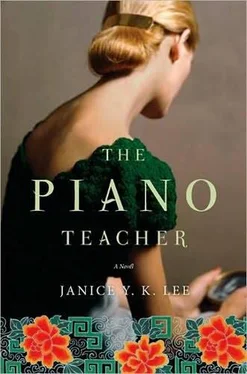“Will!” she cries. “This is serious. Dominick has promised Otsubo he will get the information and that I will help him to get it. I wouldn’t ask you if it weren’t important, but…” she trails off.
“Trudy, I can’t help you,” he says. “I cannot.”
“Will,” she says. “If you really knew what was at stake…”
But her mouth is set. She knows this man. The question is how much she can manage the other one.
By the time they get to the room, she has shaken off her bad temper. Her moodiness is like a cloak she can take on and off at will.
“If I lose my pass because of this, you’ll be the first to pay,” she says lightly. She pushes the door open. “Otsubo-san! The valiant Will Truesdale is here to tell us of the wonderful resortlike conditions in Stanley. Was it coq au vin at dinner last night? And I heard you have entertainment now. The Stanley Players?” And she’s off, bubbling with vivacious energy, going around the room, dispensing kisses and quixotic pronouncements, clinking ice in highballs, as if she hasn’t a care in the world, as if she hadn’t fixed him with a long, pleading look right before they entered.
Dominick joins them for lunch, and Will notices the way Otsubo looks at him with barely disguised contempt, and yet, now his hand lingers on Dominick’s shoulder longer than necessary, he allows Dominick to serve him food, and Dominick treats him with a servile facility that sickens Will. So that’s how it goes, he thinks. The sophisticate becomes the dog and the soldier becomes the master. Brute force trumps all in the end, doesn’t it.
Still, this is not what concerns him. What’s been eating at him since they alighted from the car and made their way to Trudy’s suite is something else entirely.
What is making him uneasy is his own unwillingness to compromise and where it might be coming from-the niggling feeling that he cannot shake: that he is calling his reluctance integrity, but what it might be is simply cowardice.
ARBOGAST IS SCREAMING. Will cannot stand to hear it, cannot stand not to hear it. He is frozen, wants to clap his hands over his ears, wants to scream himself. Around Will, the adults are pale and silent, mothers rushing the children away.
Usually the guards take the unfortunate suspects away to a far-off house where they are made to sign their confessions, written long before they start to talk. But Arbogast! They had come silently, grimly, filled with purpose-two men-and seized him under his arms and dragged him to Ohta’s office, just next to the officers’ mess. He had gone quietly, but then the screaming started.
It has been three days since Will returned from his furlough and he has made it a point to avoid Arbogast, as if even coming close to the man will transmit his secret to him-a secret he has no intention of learning if he can help it.
He doesn’t want to know anything about Arbogast. If he is the type of man to keep a secret to the end, if he is the kind of man who will value his family more than his country, or if he is the kind of man who will take a deal to better his circumstances. He wants to know nothing. Instead, he tries to ignore him-the once proud man with his swollen beriberi feet, dragging around the camp, complaining about his wife and his dysentery.
The door opens and Arbogast is brought out, bucking. Strange how violence is not as vivid in real life. There are only a few streaks of blood. Mostly the impression is that he is wet. The water torture. They take him to the outskirts now. He is still screaming but his voice is starting to fray from the exertion. Will’s own throat hurts from the tearing sounds coming from Arbogast’s mouth.
So this is the man he reveals himself to be, Will thinks suddenly, inappropriately, bloodlessly-a man who screams when he is in danger. He hopes he himself will be silent. But one never knows.
Johnnie is at his side suddenly. They watch the man being dragged off again.
“That poor devil,” he says. “I wonder what they think he’s done.”
“Does it matter?” Will says.
“Not at all,” Johnnie says. He glances at Will. “What a cynic you’ve become.”
The next day, Arbogast is brought by two soldiers to his room and dumped unceremoniously on his bed, where Regina has a fit, falling and having hysterics on the floor while her husband lies, nearly unconscious, above her. His right hand is gone, the stump of his wrist wrapped in bloody rags.
Some sensible women drag Regina away and ply her with tea while the doctor is summoned. He shakes his head, powerless without any equipment, any medicine.
“What can I do?” he says. “He will live or die. That is all.”
They leave him there, with the powerless doctor, his face swollen blue beyond recognition, blood from the wound soaking through layers of ripped sheets. In the morning, the other residents of D Block will complain they could get no sleep because of the old man’s moaning. Arbogast, the rich businessman, has been reduced to this, and the others have been reduced to that.
The secret must be out now, Will thinks. And that should be that.
VICTOR CHEN was in a panic. Even Claire could see that, hidden away in the piano room. He was streaming from room to room, shouting at the servants, shouting at Melody, picking up the phone and banging it down again.
For the sake of the child, she tried to keep the lesson going but it was almost impossible. After a door slammed for the third time, she reached over and shut the instruction book.
“Well, Locket, what do you say?” she said.
“About what, Mrs. Pendleton?”
For the first time, Claire felt sorry for Locket. What must it be like to live in a house like this with parents like Melody and Victor? The child’s face was heartbreakingly smooth, the Oriental skin almost glossy, her eyes curious hazel orbs. Claire reached over and tucked a loose strand behind Locket’s ear. The maternal gesture surprised her almost as much as it did the girl herself, who gave a quick, shy smile.
“How about we finish a little early?”
“All right, Mrs. Pendleton.” Locket got up quickly, bumping the piano, and spilled the glass of water that had been sitting on top. “Oops,” she giggled. “Mummy says I’m very clumsy.”
“You just have to be more careful,” Claire said. “All children are careless.”
“Mummy says I give her a headache,” Locket said more somberly. “I’m not to disturb her in the afternoons anymore so that’s why she’s got me signed up for so many lessons.”
“I’m sure she wants you to grow up to be an accomplished lady with many interests.” Claire patted her head.
“We’re having a party!” Locket brightened. “For the queen’s coronation. Daddy got a big honor from the queen, you know.”
“Yes, I heard. You must be very proud.”
“I’m getting a new dress. It’s a tangerine silk taffeta with guipure lace,” the girl recited carefully. “Mummy had the lace flown in from France and it’s the only one of its kind in Hong Kong.”
“That sounds lovely, Locket.” The girl beamed, then looked uncertain.
“Of course,” Locket faltered, confessed, “it’s just the leftover from Mummy’s dress. She had some extra so she gave it to me so I could have it put on mine.”
“I’m sure you’ll both look a treat,” Claire said.
The reason Victor Chen was in such a state, Claire surmised, was what had appeared in the paper today. It had been relegated to page 7, pushed back by the relentless, breathless coverage of Princess Elizabeth and the latest details of her procession to Westminster Abbey, but it was still there-a small column about the formation of a War Crimes Committee, to be headed by a Sir Reginald Lythgoe, based on new information that had come to light. Will had pointed it out to her earlier in the afternoon.
Читать дальше












